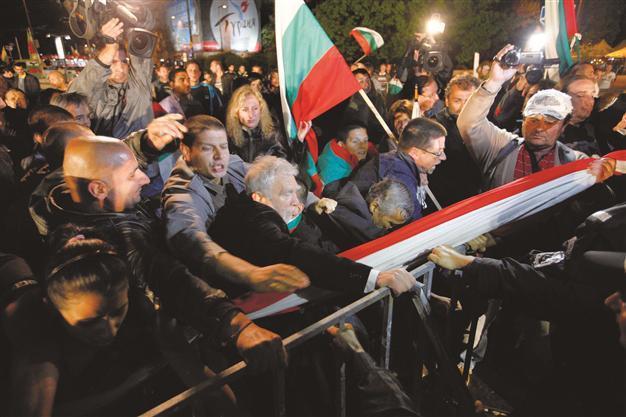Uncertainty dominates Bulgaria after elections
SOFIA

Protesters try to remove a metal fence outside the National Palace of Culture, where the political parties in the elections holding news conferences in Sofia. REUTERS photo
Bulgaria faced fresh political uncertainty yesterday after ex-premier Boyko Borisov fell way short of a majority in elections held three months after mass demonstrations forced his government to resign.
Bulgarian parties tried to cobble together a government however, other parties were reluctant to work with centre-right GERB. Nearly complete results showed an unpredictable nationalist group had the balance of power. “There is nothing dramatic if we cannot form a government. But for the others after us, it will be extremely hard, too,” said Ivailo Moskovski, a senior GERB member and former minister.
After a tense campaign marked by allegations of vote-rigging, Borisov’s conservative GERB party came first with 30.71 percent of the vote, according to official results. Second place went to the Bulgarian Socialist Party (BSP), with 27.1 percent of the vote. Widespread disenchantment with the voting process was reflected in turnout figures of just 53 percent, the lowest for any parliamentary election since the fall of communism in 1989.
Analysts predicted that the 53-year-old would fail to convince any of the other three parties that won seats to enter into a GERB-led coalition to run the EU’s poorest country. “This is goodbye for GERB. They will not govern the country,” Gallup analyst Kancho Stoychev said, adding that a scandal-ridden campaign and allegations of election fraud had put GERB in “total isolation.”
Borisov resigned from office in February during protests against low living standards and corruption, when seven people set themselves on fire, and the unclear election result raises questions over Bulgaria’s economic policy and may require another poll, possibly in September.
The only other parties to win enough votes to enter the 240-seat Parliament are the minority party Movement for Rights and Freedoms (HÖH), which is represented in Parliament and mostly depends on Turkish-origin Bulgarian citizens’ votes, with 10.59 percent and the ultra-nationalist Ataka on 7.38 percent. Ataka, Borisov’s most likely partner, late on May 12 ruled out backing a GERB cabinet.
Early election possible, minority party leaderAnother minority party, The People’s Party for Freedom and Dignity (HŞHP), which has been competing with HÖH for Turkish votes, were unable to pass the election threshold. The Party’s chairman Korman İsmailov told Hürriyet Daily News that HŞHP failed in elections because the party had formed just five months before the polls.
According to Ismailov, it won’t seem possible to form a powerful government due to low turnout at the polls. “The political situation in Bulgaria is now in more serious instability. Total turnout was above 50 percent, therefore the future government will only represent 20 percent of the country,” he said. İsmailov also said there would be an early election due to the fact that the government was unlikely to be successful. Speaking about the rival party, HÖH, İsmailov said that the party had faced nearly a 40 percent fall in its votes compared to four years ago. “The results revealed difficulties in HÖH’s presentation of people,” he added.
“This is the first time since the end of communism that an outgoing party wins the next election,” Yuliy Pavlov from the Centre for Analysis and Marketing told private TV7. “And for the first time the winning party cannot govern as it is in total isolation.” If Borisov fails to form a government, the mandate will pass to the socialists, who have already said they were ready to seek broad consensus for an anti-crisis cabinet of technocrats, possibly headed by an ex-finance minister, Plamen Oresharski. “The next PM’s name is Plamen Oresharski,” predicted Pavlov.
